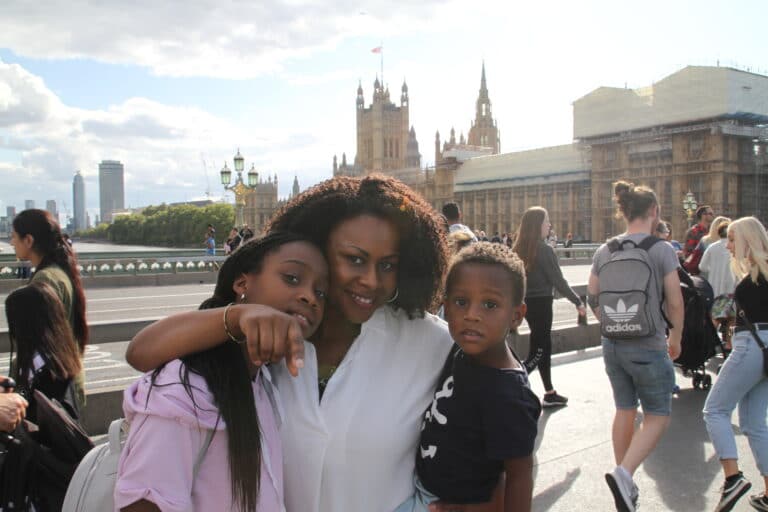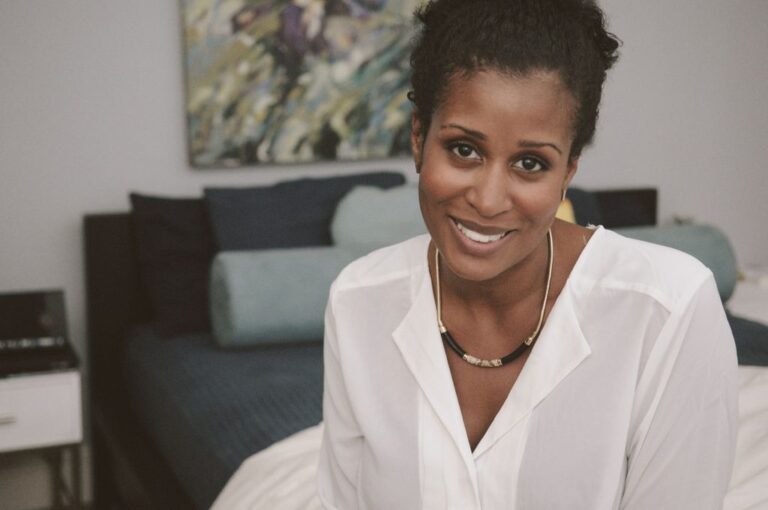Museum curator Zoe Whitley didn’t exactly love London when she moved there in 2001 for school. In fact, “I hated it,” she says, laughing.
The biggest drawback was the well-known British passive aggression masked as politeness, which Whitley initially had a hard time navigating. She eventually found a group of women she could relate to, and, after finding a job just a week after she finished her masters degree, Whitley decided London wasn’t so bad after all. (She’s now the curator of international art at the esteemed Tate Art Museum.)
Also helping her adjust to life in the UK was her future-husband journalist Shane Richmond. The couple met in a Yahoo! chat room in 1999 while she was still an art student at Swarthmore; they became real-life pen pals after chatting for less than five minutes about art and music—Shane was a DJ then—and were married in 2003.
Now that Whitley considers London home, she doesn’t plan on leaving anytime soon. She tells us how she adjusted to Britain’s culture and how she and her husband raise their adorable 6-year-old daughter Harriet to be American and British.

How were you able to adapt to life in London after initially hating it when you first moved here?
It was really hard at first. I never considered myself [to be] someone who couldn’t adjust quickly: I went to a French school from 1st to 8th grade [and] I love meeting new people, so I thought I was adaptable. People here are harder to get to know and don’t really open up easily, so it took time to get to know people.
I was never considered to be the loudest or the most aggressive [person] at home until I got here, so I had to figure out British passive aggressiveness and how to deal with that.
The flip side of the British stereotype of being polite to a fault is that being direct can be interpreted as a sign of rudeness. In some circles, there isn’t a culture of saying exactly what you mean. To only slightly exaggerate, in some work contexts people might go to great lengths not to say “No” when really that’s what they want to say. The response to an idea might be met with, “Well yes, we could do that. Certainly it’s one option among many. Or we could not do that. That’s also an option for us to consider.” Twenty-five words when one would do!
After finding a group of like-minded Black women who got me, it was easier. It was actually really unusual how we ended up friends. In 2003, a woman asked me if I like to dance and when I said “Yes,” she invited me to her engagement party. [Laughs] Most of my friendships started in similar ways. The connections were organic and they are really good friends of mine today.
I also fell in love with my husband here and this is his home. He made it feel like home for me, too.
How do you navigate raising your daughter as an American living in London?
It is very important to the three of us, Harriet included, [that] she maintains some of her American-ness. We go to D.C. to visit her grandparents during the summer break [so she can] be with her family.
Harriet does recognize her own sense of blackness and really seems to identify with it. Although she has fairer skin, when she colors, she always colors with brown crayons. She makes sure to say “toe-may-toe” every time she says it instead of pronouncing it as “toe-mah-toe,” to claim her American-ness. She also loves to dance and do the “nae nae” whenever the song comes on.
So much of the world is here [in London]. Students in her classes are mixed like she is and so many are able to share those different perspectives. I tend to work a lot with Black British artists and members of the Diaspora, so I like to expose Harriet to those things as well.

Do you worry about your family’s relationship with your extended family in the U.S.?
Not really. We go home every summer and on breaks. My mom even said, “You’ve got a real good quality of life here.”
I actually think that we would be missing out on our family and friends in London if we moved back to the States. My mom manages a doctor’s office in D.C. and she has 10 days off a year. If I have to take off because my child is sick or I’m sick, I would have no free days to do anything. I really don’t know how we would see our British family and friends that way. Here there is more of a culture of having time off.
What is the cost of living like compared to the U.S.?
London is pretty expensive, I have to say. I live in South East London. It wasn’t trendy when I moved here at first, but it was relatively affordable. We live in a loft-style apartment with a dry cleaners on one side of us and a pizza place on the other. It’s without the cachet, but I love it because everyone knows each other.
We take public transportation. We get monthly tickets for work. The cost of a monthly travelcard covering zones 1-4—the sector we fall into because of where we live—is now £177.10 but it goes up every year. That’s about $265 per month. It takes us about 15-20 minutes on a train or the overground service to get into central London. We just got a second hand Volkswagen, so we are really excited about that. [Laughs]
Childcare is really expensive. Almost all of my salary was going toward childcare at the beginning, but we made it work because we had two incomes. We save to see family every year. [When I went back to work after maternity leave], I think we were paying £35, or around $53, per day which included home cooked meals and even potty training! In the past six years, many more families with preschool age children have moved into the area. Most of my friends pay about twice that per day now, which would be about $100+ per day.

Are you a UK citizen now? If not, how often do you have to renew your visa?
I came here on a student visa. I had to have a letter from the university in order to even be allowed to come to the UK.
It’s not this way for everyone, but the man who stamped my passport was particularly difficult and did not sign my documents for the entire time that I would be in school. He knew I had to take an exam at the end of my first year in order to pass and remain in the program, so he only stamped my passport for the first year and I had to go back and get it signed to stay for the rest of the program.
When I applied for my first job here as an assistant curator, I did not have the right to work because I am still a U.S citizen, but now I have the right to work because I am married. It’s different for others. One of my distant cousins’ job pays for her work visa; it just depends on the sector you work in.
My visa says “indefinite leave to remain.” My passport expires in four years, but other than that I don’t have to do anything else.
What are some benefits to living in London as opposed to the U.S. when it comes to raising Harriet?
I think London is a safer place to raise her. I like that there’s a sense of innocence that she has preserved longer than I think she would have in the States, but there are moments where we have to have major discussions about life.
In August, we were in D.C. and while we were listening to the radio, we heard about Mike Brown. It was difficult to explain to her what was going on, given that this occurs with far less frequency in the UK.
Harriet had just had a field trip where they discussed how if someone is lost, they should go to the police for help, so it was challenging for her to hear about the mistrust people had for the police. Someone on the radio said that “there are a few bad apples,” in regards to the police, so we were able to talk about it. I think it is important to have these conversations with her, even at a young age.

This is on a completely different note, but I really like that people have time here. I always defend people in the U.S. who don’t travel because it is so limited there. You have to be in a high socioeconomic strata to even travel, and if you only get a few days off a year, it makes leaving the country almost impossible.
Time [off] is also a huge plus, especially when I had Harriet. Here, we get a year off after we have a baby. It is normal to take that time. Taking a year off is not just for [when you have] your first child, but for all of your children. I know people who have taken off [for] two or three years. I work four days a week now, but I am so grateful to have had that time off at the beginning without having to worry about my job or finding someone to take care of Harriet immediately.
What’s something you miss from America?
[“Chicken. She really likes chicken,” Harriet chimes in.]
Yes, I love Popeye’s chicken. My mom’s chicken is good, but I have to have [Popeye’s] whenever I’m home.
What advice would you give to someone who wants to move abroad to London?
I would say to really research the place you want to go before you move there. Take the time to learn how to communicate in the community you live in. I hated it at first, but if you find people you connect with it can make all the difference.

















